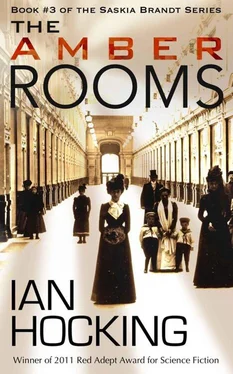‘Will the Tsar be at home?’ Saskia asked.
‘The Imperial family are resident in the Alexander Palace only over winter. Today, they are in Peterhof. My father has been making arrangements for their cruise on the royal yacht, Standart . If the family keep to their routine, they will visit Poland over the summer. Then they’ll return to their estate in the Crimea, and finally back to the Alexander Palace.’
‘Is the Tsar a good man?’
Pasha looked at her as though the question was unanswerable. It was, Saskia reflected, possibly treasonous. ‘Ms Tucholsky, he is the Tsar.’
‘I suppose his life must be a little dull.’
‘He is a private man. He wishes to keep a distinction between his public and private lives. Fatherhood is important to him.’
‘As Freud tells us, fatherhood can be a cryptic condition.’
‘I don’t understand.’
‘Cryptic; скрытый. Mysterious. Don’t you find your own father mysterious?’
Pasha took a bite of his sandwich and shrugged. ‘My father doesn’t speak to me about his business. But he’s brave. He fought in the Russo-Turkish War. When Kars fell, he was entrusted with bearing the news of victory to His Majesty, Alexander II. The Emperor made him an Aide-de-Camp. My father has been attached to the Imperial household ever since. One day, he might be Grand Marshall of the Court. Think of it!’
Grand Marshall , thought Saskia, of the Court of Nicholas the Last.
‘I will. Meanwhile, tell me about the Tsar’s children.’
‘I seldom see them. The Tsarina prefers to keep them away.’ He waved his hand seriously. ‘They are, so to speak, cryptic.’
Saskia smiled inwardly. ‘Sensible,’ she said.
At the Tsar’s Village, they alighted as rain began to fall. Pasha took Saskia’s umbrella and held it above her while they walked to the taxi rank. The face of the foremost driver was no more than a nose between hat and collar. He nodded at Pasha, who opened the carriage door, kicked down the steps, and waited for Saskia to ascend. He followed her inside. They sat opposite one another in the luxuriant gloom. Rain crackled against the roof. The carriage started off with a jolt. They rode in silence. Half way to the Summer Palace, Saskia felt Pasha’s ankle resting against hers. She moved her leg.
The cab stopped on Dvortzovaya Street. Outside, Saskia could see the gate to the palace square.
‘Do you agree,’ asked Pasha, ‘that it should be acknowledged as a wonder of the world?’
Saskia gave him a wry look.
‘Your question has an overworked quality, Pavel Eduardovitch. Much like the palace.’
A man descended the marble stairway of the atrium. He was bow-legged, middle-aged and wore polished shoes. He was dressed like a clerk, not a member of a grand household. When he spoke over his clasped hands, his Russian was slow and he had difficulty with the rolling ‘r’. Saskia knew he was German before he introduced himself.
‘Mr Mülheim.’
Saskia accepted his bow with a nod. ‘Tucholsky,’ she said. ‘I am the tutor of Count Pavel Eduardovitch Nakhimov.’
Mülheim looked at her handwarmer, and the two hands she appeared to conceal. The weather was wet, after all—not especially cold. Saskia wondered if he had checked the visitors’ book. She had not permitted Pasha to sign it. As for her own name, she had jotted something unreadable. But Mülheim wore only an expression of studied servility. If he had suspicions, he withheld them.
‘Good morning, your honour,’ he said to Pasha. ‘We’ll begin at the First Suite of Apartments.’
‘I hope we will have time to see the Grand Ballroom,’ said Saskia, ‘and its enfilade.’
Mr Mülheim nodded graciously as though its introduction would take a particular skill that he was happy to exercise. Then, he led them up the staircase.
Over the next few minutes, a peculiar tinnitus began to distract Saskia. Her first thought was that an insect, perhaps a fly, was trapped behind a hanging. But the buzz persisted as they passed from room to room. When they were standing in a small bed chamber that overlooked the park on the south side of the Summer Palace, Saskia noticed a growing clearness in the sound. The snowy component of noise was fading. It was replaced by an irregularity. It might have been a radio transmission.
Then it stopped.
Mr Mülheim led them through an illuminated door. This opened onto a church hall. Its walls were pale. Through one of the watery windows, Saskia could see the palace square. The horse guards were returning from their patrol to the main gate. She watched the second rider wheel his horse in a Caucasian flourish that returned her, with an ache, to the unchanging and endless days of her last horse-rides overlooking the Black Sea.
Saskia and Pasha exchanged a smile. The memory of the tinnitus faded.
At length, accompanied by Mülheim’s narrative, which was heavy with architectural terms, they passed through the apartment of the Empress Elizabeth Alekseyevna and came upon the choir gallery. The church of the Great Palace was, thought Saskia, a marvel, and outshone the somnolent words of Mülheim. She turned her head to the painted ceiling as Mülheim described the Te Deum sung on November 1st, 1768, in thanksgiving for the recovery of Empress Catherine II.
‘In the Sacristy,’ he said, speaking now to himself, ‘we find the Holy Cross, the chalice, and the Holy Gospel, which is made of pure gold. We also find a nine kilogram chalice of gold.’ Saskia sighed through her nose. Why did he prefer “We find” over “There is”, suggesting a doctor at an autopsy?
Some soldiers passed them.
~
There had been a fire in 1820, said Mülheim, but its cause remained unknown to her; his next words were rendered insignificant by the light and beauty of a hall whose length matched the width of the palace. Three windows at the north end overlooked the square; three at the south overlooked the gardens. Its style was modelled on that of Louis XV, Mülheim reported, almost to himself. The epic ceiling, representing Olympus, had been restored by an academic following the fire.
‘Fire,’ said Saskia. The word was an idle reflection of her thoughts, and neither Mülheim nor Pasha acknowledged her. They walked ahead. Their feet clopped like hooves on the parquet. The walls were crammed with pictures; a single glance lighted on hundreds. ‘Tell me,’ said Saskia, ‘is the Amber Room close?’
‘It is,’ said Mülheim.
Saskia remembered looking through the window at the rider who wheeled his horse in the manner of an arch showman. She turned once more to the window. The courtyard was empty.
A thread of fear twisted through her abdominal muscles. She could not be explicit about the source. Simply, her comfort was slipping away, replaced by dread.
‘Are you leaving?’ asked Pasha.
‘What?’
She blinked. Pasha’s expression was hard to interpret. It might have been reproach. Why had he asked her if she were leaving? Did he know something about the Amber Room? Arctic , she told herself. Cool as . This is no more than anticipation. Mülheim was about to admit them. She should not kick open the door, or rush, or do anything that might compromise the position of her tutee, Pasha. He, after all, would have a life when Saskia was gone. She did not wish to make it difficult.
Mülheim inclined his head to nearby door.
Is that the Amber Room? she thought. Am I this close, finally?
‘What’s all this?’ asked Mülheim. He frowned and turned to a horse guard, whose loud approach was spoiling the quietude. Saskia turned, too. She noted the rich black of the boots, the white tunic and its red cuffs, and large hat and the bearded face beneath it.
Читать дальше












